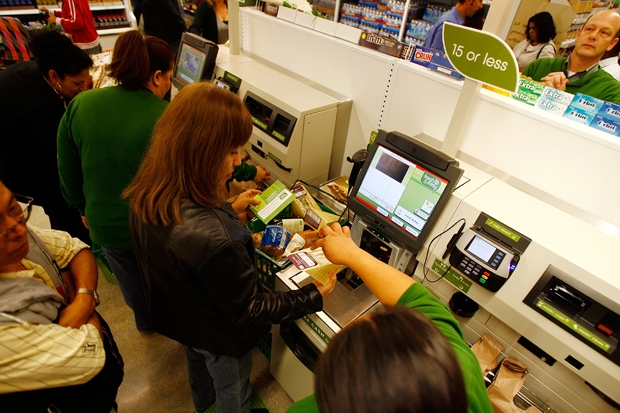I spent the last few days in Deal and Folkestone with Professor Richard Thaler at Nudgestock, Ogilvy’s seaside festival of Behavioural Science. On my way home I decided to stop off at M&S to buy some runny scotch eggs and a pie, accompanied by some unwanted green things to make my basket look middle-class. Finding a long queue at the main checkout, I grudgingly took my goods to the self-checkout machines.
(For the uninitiated, Richard Thaler is the co-author of Nudge, and more recently the author of Misbehaving. He is perhaps the godfather of behavioural economics, a dissident strand of economics which holds the outlandish view that the discipline might have something to learn from observing the behaviour of real people in everyday life, rather than concentrating on the serious business of constructing elegant mathematical models unsullied by any contact with humanity. Central to his work is the demonstration that small contextual cues — or ‘nudges’ — can have very significant effects, for good and ill, on people’s behaviour.)
Anyhow, some of Thaler’s magical aura had clearly transferred to me. Because just as I was about to start the usual infuriating and demeaning business of scanning my own shopping, I had a lightbulb moment. Suddenly I spotted what was wrong with the whole self-checkout malarkey. In short, the design of the machine contains a bad nudge. Above the weighing platform where you place your scanned shopping, two prongs stick out, with the handles of carrier bags looped over them. The inference you draw is that you are supposed to place your items into one of these bags after scanning. No doubt this was the designer’s original intention. Under no circumstances should you respond to this cue — as that way disaster lies. Instead try placing the scanned items unbagged on the platform, and bag them up only after you have paid.
The superiority of the Thaler-Sutherland postulate lies, I think, in the fact that any collection of items in a bag is inherently unstable. Since the weighing platform is designed to detect the weight of a gnat, each time your shopping settles or shifts within the bag, it drives the machine into spasms, where it will start saying things like ‘opening the pod bay doors’ or, more usually, ‘unidentified object in the bagging area’. If you change the order from scan-bag-weigh-pay to scan-weigh-pay-bag, and ignore the seductive siren-call of the two prongs, the experience is surprisingly tolerable. In fact the likelihood that you will be arrested for repeatedly punching a machine and shouting ‘fuck!’ is significantly reduced.
Just as I was looking forward to the appearance of Welsh artisan-made Laverbread & Glengettie flavoured e-smoking liquids, some killjoy at the Welsh Assembly is planning to ban the use of e-cigarettes in closed public spaces, or wherever smoking is banned. This is daft. At work, someone asked what our company policy was on vaping; my response was that it did not much matter if we had a rule on smoking e-cigarettes but that if we did, it must be markedly less strict than the rule for conventional smoking… perhaps we should open a vaping room. My argument was that if you made people go outside to vape, they would think, ‘Well, since I’m now here standing in the rain, I might as well have a full-blown fag instead.’ I don’t know what the Welsh for ‘path dependence’ is, but someone in Cardiff should start researching it now. If you have the same rule for vaping as for smoking, it’s like holding a meeting of Alcoholics Anonymous in a pub — forcing people who are trying to quit to gather in the places where it is easiest to lapse.







Comments